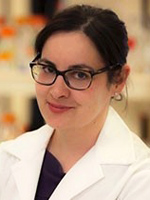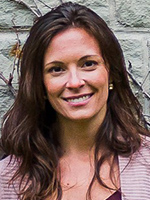Five researchers from Dalhousie are receiving new funding to acquire the cutting-edge tools needed to conduct world-class research. This morning (Wednesday, April 11), at the University of Victoria, the Honourable Kirsty Duncan, Minister of Science, announced an investment of more than $42 million for 186 research projects taking place at 37 universities across Canada.
Dal researchers Jeanette Boudreau, Saurabh Chitnis, Rebecca Moyer, Owen Sherwood and Svetlana Yurgel were included in the national announcement, and will receive a total of $559,571 in funding for their research projects.
The funding is provided through the Canada Foundation for Innovation's (CFI) John R. Evans Leaders Fund (JELF). It is designed to help universities attract and retain the best and brightest researchers from around the world by giving them access to cutting-edge research infrastructure.
“I want to congratulate all of today’s recipients who will now have access to state-of-the-art tools and research infrastructure that will allow them to explore some of our most pressing questions,” said Minister Duncan in a news release. “The answers they find contribute to the evidence our government needs to build a stronger economy and a more prosperous future for all Canadians.”
Highlights of funded projects:
 Jeanette Boudreau – Faculty of Medicine
Jeanette Boudreau – Faculty of Medicine
Developing natural killer cells for immunotherapy
The Boudreau laboratory is studying a type of immune cells called natural killer (NK) cells. NK cells are important for fighting viruses and cancer, and permitting successful pregnancy. They are controlled by genes that vary from person to person, and by proteins that vary from NK cell to NK cell. They hold immense potential for immunotherapies - medicines that use a patient’s immune system to cure disease - but NK cells have been challenging to study because of their diversity.
“I’m thrilled to receive this award from CFI-JELF,” says principal investigator Jeanette Boudreau. “With this grant to my laboratory, we will be able to purchase state-of-the art equipment that will accelerate my laboratory’s research by enabling multi parametric assessments of human NK cells.
With the funding provided by this CFI John R. Evans Leadership Fund award, the Boudreau laboratory will be equipped to study the genes, proteins and functions of human NK cells at a resolution that has previously not been possible. Specifically, their new suite of equipment will allow laboratory members to establish a biobank of samples from over 300 healthy human donors, to study the genes and function of these cells, and to build tests to perform experiments to discover how NK cells work, and can be used in medicine.
 Saurabh Chitnis – Faculty of Science
Saurabh Chitnis – Faculty of Science
Installation of a Main Group Catalysis and Materials Chemistry Lab at Dalhousie University
Dr. Chitnis will begin as Assistant Professor with the Department of Chemistry in July 2018. His research group will examine the properties, sizes and shapes of the world’s building blocks: elements in the Periodic Table. Better defining these elements is the first step to creating new useful materials such as plastics, catalysts, and fuels.
This CFI award will enable the Chitnis group to conduct experimental aspects of their research program and provide high-level technical training to researchers with chemistry careers in government, industry and academia. Reducing the negative impacts of industrial emissions, discovering new catalysts for safer and more efficient manufacturing of pharmaceutical chemicals and creating new polymers for responsive materials in electronics are goals of Dr. Chitnis’ research program.
"Smart materials that combine traditional plastics with the electronic properties of metallic elements will allow electronic devices to be lighter, more flexible, and tolerant of extreme conditions,” says Dr. Chitnis. “Accessing such materials will dramatically expand our ability to explore new frontiers."
 Rebecca Moyer – Faculty of Health
Rebecca Moyer – Faculty of Health
TRIAGE: Translating clinical biomechanics and rehabilitation Research to Improve Arthritis Guidelines and Education
Declines in physical function associated with aging and bone and joint diseases, especially osteoarthritis (OA), greatly impair mobility and quality of life for millions of Canadians. Despite their pervasiveness, declines in mobility are amenable to prevention and rehabilitation - if we can better understand mechanisms and advance interventions appropriately.
Dr. Moyer and her team will be investigating how bones and muscles work together to control functional movements, how age and OA impair control of these movements, and how rehabilitation interventions tailored to these impairments affect mobility and quality of life. Her research will focus on critical issues in knee and hip OA, and seize the opportunity to draw upon the thousands of individuals in Nova Scotia currently seeking treatment and often waiting for joint replacement surgery (average wait time 3-years).
Dr. Moyer’s findings will lead to improved fundamental knowledge underlying movement disorders and tailored rehabilitation strategies, while simultaneously providing parameters to help identify patients most likely to benefit from targeted rehabilitation programs or surgical intervention.
 Owen Sherwood – Faculty of Science
Owen Sherwood – Faculty of Science
Stable Isotope Biogeochemistry Laboratory
By the year 40, Arctic summer sea ice is expected to disappear completely for the first time in perhaps the last 13 million years. Dr. Sherwood is an Assistant Professor in the Department of Earth Sciences and his research program aims to develop and apply novel techniques for tracking long-term ecological change in the Arctic. His team will do so by examining the record of past change preserved in deep-sea corals and sediments. To unlock the information contained in these natural archives, new biogeochemical methods are needed. This CFI award will establish a new Stable Isotope Biogeochemistry Laboratory at Dalhousie. This will allow Dr. Sherwood to gain a clearer picture of past changes in marine productivity in relation to sea ice extent, better equipping us to predict Arctic ecosystem responses over the next 100 years.
“The new Stable Isotope Biogeochemistry Laboratory will provide Dalhousie with state of the art technology for molecular-level isotope analysis of marine organic materials,” says Dr. Sherwood. “With these tools we can begin to unlock the history of Arctic climate change from a whole new perspective. If we can find out what happened in the past, we can predict the future with much more confidence.”
 Svetlana Yurgel – Faculty of Agriculture
Svetlana Yurgel – Faculty of Agriculture
Infrastructure for Plant Microbiome and Plant-Microbe Interaction Research Program
With the continuous increase of human population and decrease of agricultural land availability, an improvement of the efficiency and sustainability of land use becomes one of the main goals of a modern economy. Plant associated microorganisms play a vital role in plant health, stress resistant and production. Therefore, manipulation of plant-associated soil microorganisms is an important step to low-cost cropping systems, which can improve efficiency and reduce the environmental footprinting of crop production.
Dr. Yurgel’s innovative research program will develop alternative and complementing methods to improve plant health and resistance to biotic and abiotic stresses and increasing the environmental sustainability of crop production. She will employ molecular, genetic and next
generation sequencing, and OMICs techniques to evaluate and manipulate the interaction of rhizosphere and endophytic soil microorganisms with agriculturally important plants.
This research program has the potential to contribute significantly to the agricultural, environmental and pharmaceutical sectors of Canada. It will help Canadian industries increase their global competitiveness and create new economic ventures.
For a complete list of John R. Evans Leaders Fund recipients, visit the Canada Foundation for Innovation website.
Along with the funding they received from the Canada Foundation for Innovation John R. Evans Leaders Fund, Jeanette Boudreau, Saurabh Chitnis, Rebecca Moyer, Owen Sherwood and Svetlana Yurgel also received matching funds from the Research Nova Scotia Trust.
